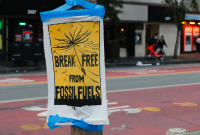Support strong Canadian climate journalism for 2025
The Public Policy Forum (PPF) is an independent, non-profit Canadian think tank that aims to “serve as a neutral, independent forum for open dialogue on public policy.” It recently released a report promoting Canada’s “low-carbon” natural gas after hosting a “high-level gas summit” last March. Last week in an opinion piece for one of Canada’s leading newspapers, it chastised Canada for not developing more natural gas for export to Europe.
It is no surprise that PPF is promoting policy to expand Canada’s natural gas industry. A quick look at its membership list reveals that the forum is widely populated by fossil fuel organizations including CNR, Cenovus, Enbridge, MEG Energy, TC Energy, Imperial Oil, Petronas, Suncor, and the Canadian LNG Alliance. There’s nothing wrong with non-profits lobbying the public on behalf of their supporters, but unfortunately, not many readers of its recent op-ed will take the time to see who is behind the message.
Former Globe and Mail editor-in-chief and PPF CEO Edward Greenspon and his team make some valid points regarding the economic opportunity that presents itself due to Europe’s natural gas shortage at the hands of Putin and his oil-igarchs. But let us not forget that this fossil fuel crisis is a short-term problem, unless you believe the war in Ukraine will continue for years to come. In order to export more natural gas, Canada will need to invest in more fossil fuel infrastructure, such as new wells, pipelines and LNG terminals. This kind of infrastructure requires massive investment and years to build out. We will not be solving Germany’s energy crisis in six months' time.
As the climate continues to warm and have its own impact on the world’s ability to produce electricity, Europe and Canada need to invest in the energy transition, not new fossil fuel infrastructure that will start becoming stranded assets over the next 10 to 15 years.
Canada is already building LNG facilities on the West Coast and a pipeline to supply them, but energy companies and their boosters are insatiable. They will use this moment in time to convince Canadians that the world needs as much natural gas as we can provide, and then some more.
That is clearly not what this world needs in the midst of a climate crisis where the repair, adaptation and mitigation costs are escalating due to heat waves, floods, wildfires, drought and extreme weather events.
Public money is far better invested in building the new economy with clean energy sources, rather than spending billions on the final years of a fossil fuel industry that has no long-term future. Clearly, oil and gas has been wonderful for Canada and the world, allowing us to enjoy lifestyles and food security that wouldn’t have been possible without this cheap and abundant energy.
But we now know there is a serious problem with the emissions coming from this industry. The costs associated with climate change are becoming glaringly apparent, and they will only continue to increase as global temperatures rise.
The fossil fuel industry is no longer a great investment for the future, but fossil fuel corporations will do everything in their power to save their business and deny the fact that we have no choice but to embark on a transition to cleaner energy.
In the current environment, why would Canada want to help increase the production of fossil fuels when the vast majority of nations have committed to net-zero by 2050?
Emissions need to start coming down as soon as possible and many nations have strong interim reduction targets to hit by 2035.
Let’s not bet on the failure of a global climate agreement that most people realize will have to happen in order to prevent extreme hardship for future generations.
Rob Miller is a retired systems engineer, formerly with General Dynamics Canada, who now volunteers with the Calgary Climate Hub and writes on behalf of Eco-Elders for Climate Action. As a climate activist, he works to stop old-growth logging in B.C., reject coal mining on Alberta’s eastern slopes, facilitate community involvement in urban afforestation, and advocate for renewable energy. Miller uses a “systems-thinking” approach to learn, understand, and defend the ecosystems that are under threat by climate change and unrestrained resource development. He lives in Calgary.






Comments
During a meeting between PM Trudeau and German Chancellor Scholtz, PM Trudeau was asked about LNG projects. He stated that the business case is not there. Given it would take at least 5 years, probably more like 10 to bring a new LNG terminal up on the East coast, would the demand still be there? Europe needs a supply of gas now. The reason they had been using gas from Russia is it's relatively cheap. LNG is not so much due to the huge infrastructure overhead. If LNG is the only way for Europe to get nat gas, you can bet it makes more economic sense for them to reduce their reliance on it significantly.
there is one reality that our government leader has not considered . germany unlike canada will make this decision based on the fact that fossil fuels are bad for the environment thus anything that germany decides upon is clean energy thanks to hydrogen created by wind turbines now that is clean . does germany need to be self reliant from russia yes and if germany can accomplish this goal through clean energy they will jump on that band wagon... maybe pm trudeau should consider that thought...
Article: "Clearly, oil and gas has been wonderful for Canada and the world, allowing us to enjoy lifestyles and food security that wouldn’t have been possible without this CHEAP and abundant energy.
"But we now know there is a serious problem with the emissions coming from this industry. The costs associated with climate change are becoming glaringly apparent, and they will only continue to increase as global temperatures rise."
Clearly, we cannot afford this "cheap" energy.
Fossil fuels are not cheap, merely mispriced. Producers and consumers externalize climate change, pollution, and health costs, downloading them to the public purse, future generations, and the environment. A massive wealth transfer from taxpayers to shareholders, and from future generations to this one. Stealing from our grandchildren.
Climate change is the biggest market failure in history. Voodoo economics.
Fossil fuels allow us to "enjoy lifestyles" that are not remotely sustainable.
Canadians have a world-leading ecological footprint of over 5 planet Earths.
The average Canadian lives far beyond the planet's carrying capacity. Rich Canadians have an even bigger footprint.
The planet cannot afford our "standard of living", fuelled by extravagance and waste. If everybody lived like us, we would need 5 Earths to sustain our resource demands and absorb our wastes. In short, we live far beyond our means.
Hopelessly unsustainable.